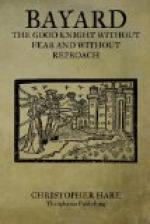“It would be very strange if I refused such a present,” said the Duke, who had already taken a fancy to the boy.
Now young Bayard, who had already received instructions from his uncle, wasted no time over his own dinner, but hurried back to get his horse saddled and in good order, then he rode quietly into the courtyard of the castle. The Duke of Savoy was, as usual, resting after dinner in the long gallery, or perron, built the whole length of the keep, on a level with the first floor, and overlooking the great courtyard below. It was like a cloister, with great arched windows, and served for a general meeting-place or lounge in cold or wet weather. From thence he could see the boy going through all his pretty feats of horsemanship as if he had been a man of thirty who had been trained to war all his life. He was greatly pleased, and turning to the Bishop of Grenoble he said to him, “My lord, I believe that is your little favourite who is riding so well?”
“You are quite right, my lord Duke,” was the answer. “He is my nephew, and comes of a race where there have been many gallant knights. His father, who from the wounds he has received in battle, and from advancing age, is unable to come himself to your Court, recommends himself very humbly to your good grace, and makes you a present of the boy.”
“By my faith!” exclaimed the Duke, “I accept him most willingly; it is a very fine and handsome present. May God make him a great man!”
He then sent for the most trusty equerry of his stables and gave into his charge young Bayard, with the assurance that one day he would do him great credit. The Bishop of Grenoble, having accomplished his business, did not tarry long after this, but having humbly thanked the Duke of Savoy, took leave of him and of his nephew, and returned to his own home.
Those spring and summer months spent at the Court of Savoy remained a happy memory to Bayard all his life. On feast-days and holidays the whole company would go out into the woods or the meadows, the Duchess Blanche with her young maidens and attendant ladies, while the knights and squires and pages waited upon them as they dined under the trees, and afterwards played games and made the air ring with their merry songs. Or there were hunting and hawking parties which lasted for more than one day, or river excursions down as far as the Lake of Bourget, where the Duke had a summer palace. It must have been on occasions such as these when the gallant young Bayard met with the maiden who caught his boyish fancy, and to whom he remained faithful at heart until the end of his days. Yet this pretty old-world story of boy-and-girl affection made no farther progress, and when the knight and lady met in the years to come, once more under the hospitable care of the good Duchess Blanche, they met as congenial friends only. The fair maiden of Chambery is known to history solely by her later married name of Madame de Frussasco (or Fluxas), and in the records of chivalry only by the tournament in which the “Good Knight without Fear and without Reproach” wore her colours and won the prize in her name.




